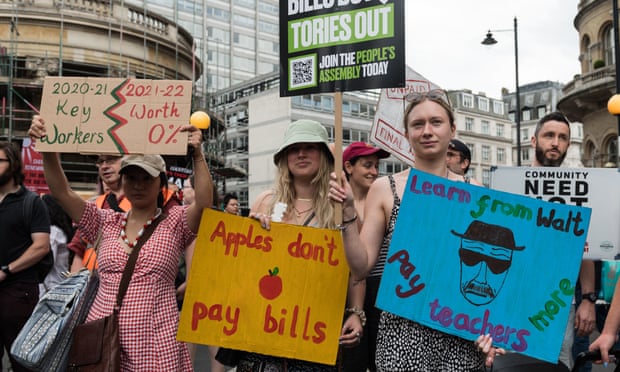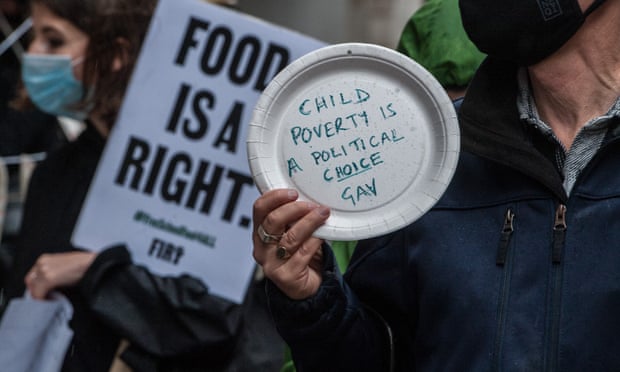Education leaders in England fear one thing: that schools, colleges and universities will be hammered by the cost of living crisis but will not be enough of a priority to get the help they need from government. And they see little hope from a change in leadership at No 10.
“Our costs are going through the roof, our staff badly need pay rises and are going to strike, our students are suffering, but our income is stuck,” said one vice-chancellor, echoing their peers in schools and colleges around the country.
While inflation and the cost of living dominate the headlines, and head teachers are having to revise their budgets to account for rising expenses, few expect that a new prime minister will focus on tackling any of the structural problems that the sector faces, after education policy barely featured in any of the Conservative party’s leadership debates.
Liz Truss, in particular, made only two policy pledges involving schools or universities: backing an expansion of grammar schools, and offering mandatory Oxbridge interviews for able school-leavers. She was silent on problems such as the persistent attainment gap between the poorest and richest pupils.
Natalie Perera, the chief executive of the Education Policy Institute, said: “I think the cost of living will potentially dominate public policy. That’s not necessarily wrong, because it is an immediate issue for many families. But it shouldn’t in theory stop the Department for Education [DfE] from trying to pursue what it thinks is the right thing to do.
“I don’t know if an incoming administration or education secretary knows what their education priorities ought to be, or whether they will be distracted by things like extending grammar schools or guaranteeing Oxbridge interviews for high-performing A-level students.
“That’s what I worry about: that we will have continued distractions over policies that will either make no difference at all to social mobility, or even harm it. Meanwhile, we’ve got an attainment gap that’s opening up between poor kids and the rest, and between the north and the south of the country.”
Rising costs are not the only immediate difficulties. Schools in England are struggling to retain experienced teachers and attract new ones, while the shadow of Covid hangs over efforts to help students recover the learning disrupted over the past two years. Meanwhile, decision-making on a host of issues – from special needs provision, to university entry requirements, to upcoming legislation – has stalled as ministers come and go.

The sector’s leaders recognise that the government’s first priorities are likely to be supporting families facing higher energy bills, with education likely to be behind social care and the NHS in the queue for help.As with businesses, energy bills for schools, colleges and universities are not capped, meaning that when their current arrangements expire they face unrestrained increases.
“When you look at the numbers from Westminster, the extra costs might look affordable. But when you look from the ground up, the money isn’t spread evenly, the circumstances of schools aren’t uniform,” said Paul Whiteman, general secretary of the National Association of Head Teachers.
“The real fear is that while a number of schools might get through the next 12 months, there’s a huge number that won’t be able to pay their bills. I was with a school leader yesterday, who was going around with his staff working out which lightbulbs were essential and which lightbulbs could be removed to try to save electricity. That’s how difficult it’s getting.
“We get told that so many more billions are going to education. But the [Institute for Fiscal Studies] will tell you that even the hollow boast that by the end next year we’d be back to 2010’s funding levels, now we won’t even reach that with inflation and the extra costs being put on schools.
“We really are in a massively difficult funding situation. It’s not about campaigning for more money. This is about campaigning to keep the lights on.”
Existing school budgets are also expected to pay for the 5% increase in teacher pay awarded by the government earlier this summer, and absorb the higher costs associated with providing free school meals (FSM).
In June the then education secretary, Nadhim Zahawi, said the daily allowance for universal free lunches for schools pupils up to year 2 would rise just 7p to £2.41 – at a time when school caterers said food prices were rising by 20%. That has left schools facing a dilemma of cutting back on portions or supplementing the cost from their own budgets.
Even before the increase in inflation, schools and universities faced action over pay, with the next occupant of No 10 likely to face multiple strikes this winter after ballots by teaching unions, school support staff and academics.
Both of England’s main teaching unions, the National Education Union (NEU) and the NASUWT, are preparing to call strike ballots, with the NEU holding an indicative ballot at the end of September and the NASUWT saying it would follow in November if there was no improvement on the government’s pay offer made earlier this summer.

School support staff, including teaching assistants, may also strike after pay increases were rejected by Unison, Unite and GMB unions, which are now all consulting their members.
Kevin Courtney, the joint general secretary of the NEU, said his members had low expectations about what a change of administration would bring. “We’re not expecting anything that we don’t have to fight for. What we’ve seen during the election for our next prime minister is that both candidates were only interested in talking to the membership of the Tory party.
“Everybody else agrees that there’s real problems – apart from the Conservative party. So this way of selecting our next prime minister doesn’t make you hope they’ll deal with the immediate crises, or that they’ll deal with the longer-term issues that matter, like the exam- factory culture in schools, or the narrowness of the curriculum.”
Even before the cost of living crisis, staff retention was a big worry for school leaders as the sector’s pay levels fell further behind those in the private sector. While the pandemic gave some respite, increasing demand for entry to teacher training and increasing retention rates, the latest school workforce census showed that 23% of those who qualified in 2019 had left teaching three years later.
The situation is more acute at further education colleges, where a new survey found gaping shortages in teachers and lecturers in subjects such as construction, engineering and computing, in a sector that has seen a decade of declining funding.
The higher education sector will be hit by another round of strikes over pay and pensions, with a strike ballot opening next week for University and College Union members at 151 campuses across the UK over the union’s demand for a 12% pay rise.
Universities face cost pressures befitting their size, while their income is continuing to be squeezed. The annual tuition fee for full-time undergraduates in England has been set at £9,250 since 2016, with the government saying it would freeze it until 2024-25.
Chris Hale, the interim chief executive of Universities UK, which represents vice-chancellors in mainstream higher education, said many institutions were feeling the financial strain as inflation ate away at their income.
“The value of the tuition fee has been eroded over time and is now worth around £6,500. I think we do need to be highlighting that pressure, we need a strong, evidence-based case to make to government to make our finances more sustainable,” Hale said.
While universities have cut costs, Hale said there was “only so much that can be done” before it undermined the ability of universities to put on high-quality courses for as many students as possible.
“The one thing universities don’t want to do is diminish quality, and ultimately they don’t want to restrict opportunity. So they are in a bind – we’ve got an increasing [school-leaver] demographic and more people who want to go to university. The pressures we saw after [A-level] results day will only increase if we don’t come up with a solution,” he said.
Hale said the plight of students needed to be included in whatever cost of living support a new prime minister came up with: “There’s a wide range of things universities are starting to put in place around hardship but I think we’ll need to see action from government as well. It’s really important that students don’t get forgotten when government is looking at how it addresses the cost of living crisis.”
Stay connected with us on social media platform for instant update click here to join our Twitter, & Facebook
We are now on Telegram. Click here to join our channel (@TechiUpdate) and stay updated with the latest Technology headlines.
For all the latest Education News Click Here
